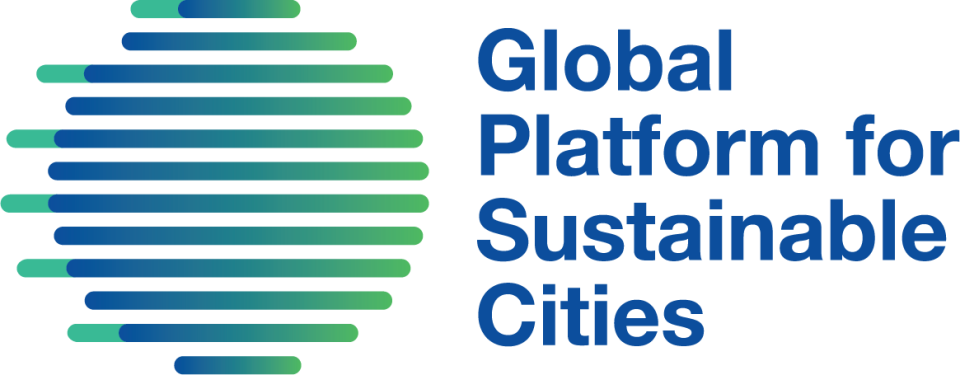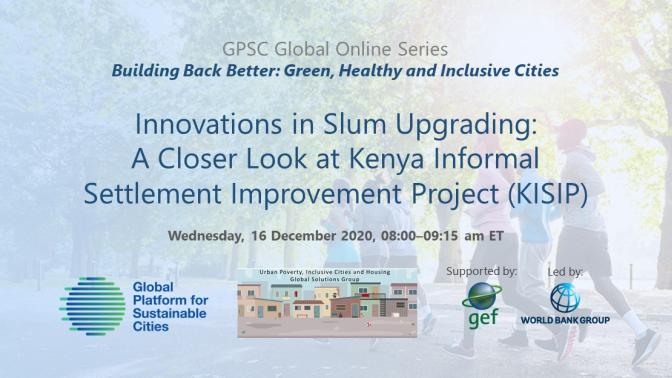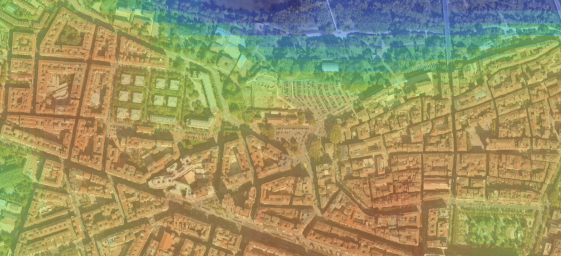The global online series titled Building Back Better: Green, Healthy and Inclusive Cities is hosted by GPSC and co-organized by the Urban Poverty, Affordable Housing and Inclusive Cities Global Solutions Group (GSG) and Slum Upgrading Knowledge Silo Breaker (KSB). The event will also mark the first BBL in the new series on ‘Innovations in Slum Upgrading’ that will be launched shortly by the GSG and the KSB. The series will have monthly events featuring innovations from World Bank Projects.
Living conditions in slums—home to more than a billion people worldwide—are often substandard and overcrowded, lacking adequate access to public services. The COVID-19 pandemic exacerbated these challenges, demanding for urgent and innovative solutions. Organized by Slums Upgrading Knowledge Silo Breaker (KSB) at the World Bank, this session will focus on innovative approaches in slum upgrading operations and will feature experiences from the Kenya Informal Settlements Improvement Project (KISIP). Using a strong community participation approach, the project increased access to basic services through infrastructure upgrading and improved tenure security through neighborhood planning and titling. Community institutions played a key role throughout the life of the project, both in representing the settlement residents and in resolving grievances. KISIP worked across 15 urban areas and provided infrastructure upgrading in 36 settlements and improved tenure security in 80 settlements. Approximately 1.4 million people benefitted from infrastructure improvements and 125,000 people benefited from improved tenure security. Click on the links to download the presentations.
Opening Remarks
Sameh Wahba, Global Director, Urban, Disaster Risk Management, Resilience and Land Global Practice, World Bank
Presentations
Tenure Regularization. Zenah Jerotich Kurui, Deputy Head fo Tenure Regularization, State Department of Housing and Urban Development
Community Engagement in Kenya Informal Settlement Improvement Project. John Wafula, Head of Environmental and Social Safeguards, KISIP
Discussion
Judy Baker, Global Lead, Urban Poverty, Affordable Housing and Inclusive Cities Global Solutions Group, World Bank
Sameh Wahba, Global Director, Urban, Disaster Risk Management, Resilience and Land Global Practice, World Bank
Bios
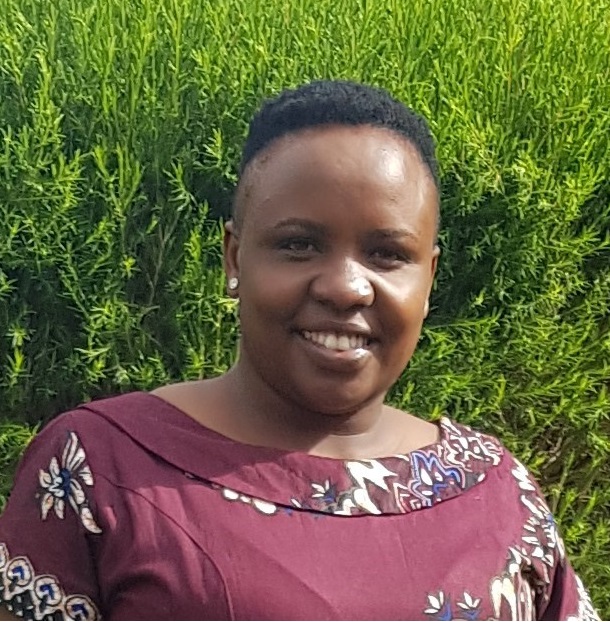
Zenah Jerotich Kurui is a Principal Housing Officer with the State Department of Housing and Urban Development. She has 9 years working experience in civil service. Zenah holds a bachelor degree in Urban and Regional Planning and has undergone numerous trainings in Urban planning, Environmental issues, Social safeguards, among others. For the four years, Zenah has been part of the Project Coordination Team (PCT) of the Kenya Informal settlements Improvement Project (KISIP) working under the Component of enhancing land tenure in the informal settlements.
 Judy Baker is a Global Lead on Urban Poverty, Housing and Inclusive Cities, and Lead Economist for the Africa Urban and Disaster Risk Management team in the Urban, Resilience and Land Global Practice at the World Bank. She has worked extensively across regions in the World Bank on analytical work and lending operations, including in East Asia, Africa, Latin America, and South Asia. This work has covered topics related to sustainable urbanization, urban poverty and low-income communities, service delivery, upgrading informal settlements, climate change and disaster risk, and impact evaluation. She has published six books, as well as produced numerous country and regional reports and strategies on urbanization issues. She has also taught as a guest lecturer in a number of universities both in the U.S. and abroad.
Judy Baker is a Global Lead on Urban Poverty, Housing and Inclusive Cities, and Lead Economist for the Africa Urban and Disaster Risk Management team in the Urban, Resilience and Land Global Practice at the World Bank. She has worked extensively across regions in the World Bank on analytical work and lending operations, including in East Asia, Africa, Latin America, and South Asia. This work has covered topics related to sustainable urbanization, urban poverty and low-income communities, service delivery, upgrading informal settlements, climate change and disaster risk, and impact evaluation. She has published six books, as well as produced numerous country and regional reports and strategies on urbanization issues. She has also taught as a guest lecturer in a number of universities both in the U.S. and abroad.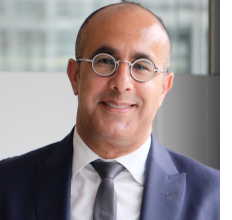 Sameh Wahba, Global Director, Urban, Disaster Risk Management, Resilience and Land Global Practice, World Bank. The Global Practice, which also covers territorial development, geospatial and results-based-financing issues, has a portfolio of close to $30 billion in commitments in investment projects, program-for-results and development policy lending, and about 450 staff. He holds a Ph.D. and Master’s degree in urban planning from Harvard University, and a B.Sc. and M.Sc. in Architectural Engineering from Cairo University.
Sameh Wahba, Global Director, Urban, Disaster Risk Management, Resilience and Land Global Practice, World Bank. The Global Practice, which also covers territorial development, geospatial and results-based-financing issues, has a portfolio of close to $30 billion in commitments in investment projects, program-for-results and development policy lending, and about 450 staff. He holds a Ph.D. and Master’s degree in urban planning from Harvard University, and a B.Sc. and M.Sc. in Architectural Engineering from Cairo University. 